 |
 |
|
|
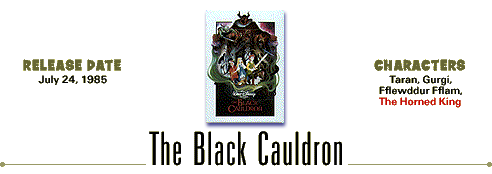 |
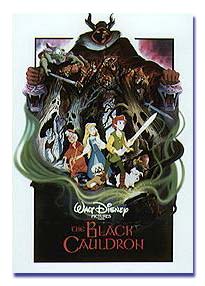 |
 he story of young Taran, a pig-keeper, who attempts
to rescue his clairvoyant pig, Hen Wen, from the Horned King's
castle. The King tries to get Hen Wen to lead him to the mysterious
Black Cauldron. Taran escapes with a young princess and a minstrel,
and with the help of mischievous Gurgi finds the cauldron. Before
they can destroy it, it is taken by the Horned King, who begins to
unleash its awesome power of producing deathless warriors. Gurgi
sacrifices himself to destroy the cauldron's power and save his
friends, but in the end, Taran defeats the Horned King and Gurgi is
restored. he story of young Taran, a pig-keeper, who attempts
to rescue his clairvoyant pig, Hen Wen, from the Horned King's
castle. The King tries to get Hen Wen to lead him to the mysterious
Black Cauldron. Taran escapes with a young princess and a minstrel,
and with the help of mischievous Gurgi finds the cauldron. Before
they can destroy it, it is taken by the Horned King, who begins to
unleash its awesome power of producing deathless warriors. Gurgi
sacrifices himself to destroy the cauldron's power and save his
friends, but in the end, Taran defeats the Horned King and Gurgi is
restored. |
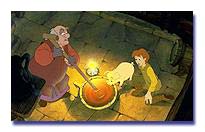 |

The production can be traced back to 1971, when the Disney Studio
purchased the screen rights to Lloyd Alexander's "The Chronicles of
Prydain." The five-volume mythological fantasy had been published
in the mid-sixties to critical acclaim and commercial success.
Adapting Alexander's books with their numerous story lines and cast
of over 30 major characters proved a time-consuming task. |
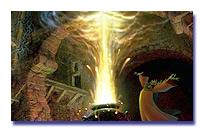 |

Several important writer/animators worked on the development of a
screenplay through the 1970s until Joe Hale was named producer in
1980. He rewrote the script, capsulizing the sprawling story and
making some changes. For instance, the Horned King was a minor
character in the series but since he had so many possibilities,
Hale expanded his role, making the villain a composite of several
characters from the books. |
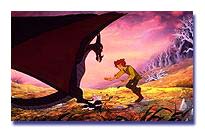 |

New technology was an important factor in the completion of the
film. Video cameras gave animators and directors an immediate and
inexpensive record of what their efforts might look like. Computers
also made inroads in the manipulation of solid inanimate objects on
screen. The dimensions and volume of objects were fed into a
computer and then their shapes were perfectly maintained as their
movement was generated by programming. Disney's venerable
multiplane cameras were updated with computers to expedite and
control aperture settings and time exposures. Another technological
breakthrough was the development of the APT (Animation Photo
Transfer®) process. The first major change in the Studio's
method of transferring the artist's drawings to a cel since
Xerox® copying replaced hand-inking 20 years earlier, the APT
greatly improved the quality of the animator's art. |
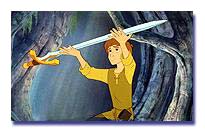 |

In all, the animated film was 12 years in the making, at the cost
of over $25 million. Over 1,165 different hues and colors were
implemented and over 34 miles of film stock was utilized. This was
the first animated Disney film made in cooperation with Silver
Screen Partners II. The sheer lavishness of the production,
however, did not guarantee huge grosses, and the film was a
box-office failure. Though the film was not nominated for any
Academy Awards®, David W. Spencer was awarded an Oscar® for
his development of the APT process. |
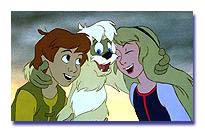 |

Directed by Ted Berman and Richard Rich. Starring: the voices of
John Hurt (Horned King), Grant Bardsley (Taran), John Byner
(Gurgi), Susan Sheridan (Eilonwy), Freddie Jones (Dalben), Nigel
Hawthorne (Fflewddur Fflam), and Phil Fondacaro (Creeper). 80 min.
Filmed in 70mm stereo-surround Technirama. |
|
 |
 |
|
|
 |
 |
 |
|
|
 |
|
 |